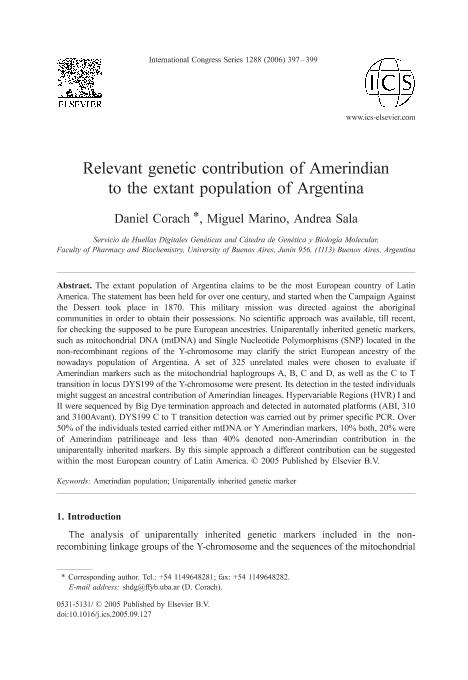Mostrar el registro sencillo del ítem
dc.contributor.author
Corach, Daniel

dc.contributor.author
Marino, Miguel Eduardo

dc.contributor.author
Sala, Adriana Andrea

dc.date.available
2020-08-07T16:11:29Z
dc.date.issued
2006-04
dc.identifier.citation
Corach, Daniel; Marino, Miguel Eduardo; Sala, Adriana Andrea; Relevant genetic contribution of Amerindian to the extant population of Argentina; Elsevier; International Congress Series; 1288; 4-2006; 397-399
dc.identifier.issn
0531-5131
dc.identifier.uri
http://hdl.handle.net/11336/111173
dc.description.abstract
The extant population of Argentina claims to be the most European country of Latin America. The statement has been held for over one century, and started when the Campaign Against the Dessert took place in 1870. This military mission was directed against the aboriginal communities in order to obtain their possessions. No scientific approach was available, till recent, for checking the supposed to be pure European ancestries. Uniparentally inherited genetic markers, such as mitochondrial DNA (mtDNA) and Single Nucleotide Polymorphisms (SNP) located in the non-recombinant regions of the Y-chromosome may clarify the strict European ancestry of the nowadays population of Argentina. A set of 325 unrelated males were chosen to evaluate if Amerindian markers such as the mitochondrial haplogroups A, B, C and D, as well as the C to T transition in locus DYS199 of the Y-chromosome were present. Its detection in the tested individuals might suggest an ancestral contribution of Amerindian lineages. Hypervariable Regions (HVR) I and II were sequenced by Big Dye termination approach and detected in automated platforms (ABI, 310 and 3100Avant). DYS199 C to T transition detection was carried out by primer specific PCR. Over 50% of the individuals tested carried either mtDNA or Y Amerindian markers, 10% both, 20% were of Amerindian patrilineage and less than 40% denoted non-Amerindian contribution in the uniparentally inherited markers. By this simple approach a different contribution can be suggested within the most European country of Latin America. D 2005 Published by Elsevier B.V. Keywords: Amerindian population; Uniparentally inherited genetic marker International Congress Series 1288 (2006) 397 – 399 www.ics-elsevier.com
dc.format
application/pdf
dc.language.iso
eng
dc.publisher
Elsevier

dc.rights
info:eu-repo/semantics/openAccess
dc.rights.uri
https://creativecommons.org/licenses/by-nc-sa/2.5/ar/
dc.subject.classification
Otras Ciencias Biológicas

dc.subject.classification
Ciencias Biológicas

dc.subject.classification
CIENCIAS NATURALES Y EXACTAS

dc.title
Relevant genetic contribution of Amerindian to the extant population of Argentina
dc.type
info:eu-repo/semantics/article
dc.type
info:ar-repo/semantics/artículo
dc.type
info:eu-repo/semantics/publishedVersion
dc.date.updated
2020-07-21T20:21:37Z
dc.journal.volume
1288
dc.journal.pagination
397-399
dc.journal.pais
Países Bajos

dc.journal.ciudad
Amsterdam
dc.description.fil
Fil: Corach, Daniel. Universidad de Buenos Aires. Facultad de Farmacia y Bioquímica. Departamento de Microbiología, Inmunología y Biotecnología; Argentina. Consejo Nacional de Investigaciones Científicas y Técnicas. Oficina de Coordinación Administrativa Houssay; Argentina
dc.description.fil
Fil: Marino, Miguel Eduardo. Universidad de Buenos Aires. Facultad de Farmacia y Bioquímica. Departamento de Microbiología, Inmunología y Biotecnología; Argentina. Consejo Nacional de Investigaciones Científicas y Técnicas. Oficina de Coordinación Administrativa Houssay; Argentina
dc.description.fil
Fil: Sala, Adriana Andrea. Universidad de Buenos Aires. Facultad de Farmacia y Bioquímica. Servicio de Huellas Digitales Genéticas; Argentina. Consejo Nacional de Investigaciones Científicas y Técnicas. Oficina de Coordinación Administrativa Houssay; Argentina
dc.journal.title
International Congress Series

dc.relation.alternativeid
info:eu-repo/semantics/altIdentifier/doi/http://dx.doi.org/10.1016/j.ics.2005.09.127
dc.relation.alternativeid
info:eu-repo/semantics/altIdentifier/url/https://www.sciencedirect.com/science/article/abs/pii/S0531513105014081
Archivos asociados
